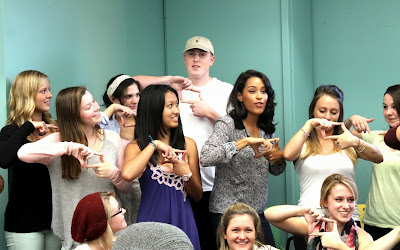There's some really good background on Tridish in a 2004 Mother Jones article. One interesting fact is he took the name Pete Tridish (pronounced petri dish) because he sees himself as helping to promote positive community growth to counterbalance corporate control. This is how the writer describes him and the Prometheus Radio Project he founded: "Prometheus, which consists of Tridish and two colleagues, has become a guiding light for community groups around the country hoping to launch low-power FM stations. Tridish & Co. provide technical advice, help with the licensing process, and even organize radio "barn raisings," at which low-power activists from around the world converge on a community for three days to get a new station up and running."
More recently, the Philadelphia Inquirer published this 2012 interviewed with Tridish.
Tridish's occupation, according to his LinkedIn profile is "Freelance Troublemaker."
Some notes from his Sept. 24 talk "A radio for the Voiceless Around the World," at UMass:
Tridish is a radio engineer and media activist. Martha Fuentes-Bautista, a communications professor who introduced him, described him as above all, "a social innovator."
A self-described "troublemaker," what he likes to do is "tip the scales" between the powerful and powerless. One way of doing this is showing people around the world how to build their own radio stations from scratch, so they don't have to rely on information controlled by corporate media organizations. He tries to create a experience of "what it will be like when we're all working for ourselves."
His biggest piece of advice for new college graduates is to find a "crappy construction job," save $2,000 and go live somewhere else in the world and learn a new language. Tridish said he didn't do that himself; he waited until he was 30.
Since then, he's worked in over 20 countries helping community groups start radio stations. He talked about his experiences in Tanzania, Mexico, Thailand and some other countries
Tridish structured his presentation as a series of lessons he learned in other countries, including, for example, that there is "more to the world than left and right," that Americans need to let go of their "American sense of time," and that in America, "we're taught that we're the best," but that "you might be surprised."
Tridish said of his fellow Americans, "It's super-interesting to see ourselves through other people's eyes." Most people he's met think Americans are "barbarians" when it comes with food, for example, "wolfing down pizza" in front of the computer, instead of socializing with others while enjoying a meal.
He got probably his biggest laugh when he described being a carpenter in Philadelphia in 1996, "running a little children's garden" and working with anti-war groups. He and his fellow talked about starting a pirate radio station, but they couldn't pull it off. Then they read "Rebel Radio," by Jose Ignacio Lopez Vigil about the extraordinary lengths El Salvadoran rebels went through to create their own radio reports, which they broadcast every night for 11 years.
"We're so lame," Tridish said he and his fellow activists said to each other the next they met. After that Tridish learned how to start a radio station and he's been causing trouble ever since.




